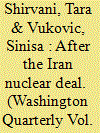| Srl | Item |
| 1 |
ID:
142800


|
|
|
|
|
| Summary/Abstract |
The Iran deal inspires new questions such as why has the agreement come about now? And can the parties create momentum to cooperate on other issues? In Europe's case, the overlooked actor may have been motivated by an overlooked element: potential energy cooperation to help escape Russia's gas monopoly.
|
|
|
|
|
|
|
|
|
|
|
|
|
|
|
|
| 2 |
ID:
114695


|
|
|
|
|
| Publication |
2012.
|
| Summary/Abstract |
Crucial challenges for multiparty mediation processes include the achievement of adequate cooperation among the mediators and consequent coordination of their activities in the mediation process. Existing literature goes only as far as to make it clear that successful mediation requires necessary cooperation and coordination between mediators, as if these features were exogenous to the process. Available research does not consider whether these features might change over time and if such change could have an impact on the overall mediation process. Experience shows that it is not rare for mediators who were initially willing to pool their resources and act in concert with one another to decide at a later point to stop cooperating. Using a game theoretical model and a comparative analysis of three recent cases of multiparty mediation, this research illustrates the importance of maintaining necessary levels of cooperation and coordination to achieve successful outcomes and provides insights on how to achieve them in case the mediating coalition is faced with internal conflict of interests.
|
|
|
|
|
|
|
|
|
|
|
|
|
|
|
|
| 3 |
ID:
186803


|
|
|
|
|
| Summary/Abstract |
The purpose of this article is to explore what explains radicalization of migrant communities and their families in their home country. Contemporary scholarship on radicalization has identified a broad range of explanatory variables, such as poverty, discrimination and/or lack of social mobility, that have the capacity to push individuals toward violence and radical beliefs. Yet, there is still a significant gap in current literature over the question why entire ethnic or national migrant groups are more represented in radical groups than others despite similar experiences. Using the case of Tajik migrants in Russia this article posits that the legacy of collective grievances and cyclical, systemic injustices, rather than a specific or personal experience of discrimination or mistreatment, are more accurate in explaining radicalization. The article pays specific attention to the role of religious or social remittances and, given a shared set of experiences, the susceptibility of the migrant's own family in the home country to the same radical ideology—despite their never leaving their country's borders. The findings suggest that the home country context, the collective account of society, is a more substantial predictor of radicalization than reception alone.
|
|
|
|
|
|
|
|
|
|
|
|
|
|
|
|
| 4 |
ID:
141714


|
|
|
|
|
| Summary/Abstract |
The present study challenges three common assumptions of the international mediation literature. First, it challenges the perception that pure or weak mediators are unable to use manipulative and coercive strategies in the mediation process, but can only resort to facilitating the dialogue and at most formulating a proposal on behalf of the disputants. Secondly, it challenges the perception that only resource-based power can be used to manipulate the process and coerce (and direct) the parties toward mutually acceptable solutions. This misconception is based on the assumption that the expansion of the zone of possible agreement, which is mainly attributed to manipulative strategies, can be achieved only by the employment of carrots and sticks which are often inaccessible to pure or weak mediators. Lastly, it shows how this type of leverage can also indicate a particular bias that an apparent pure mediator might have: bias of outcome.
|
|
|
|
|
|
|
|
|
|
|
|
|
|
|
|